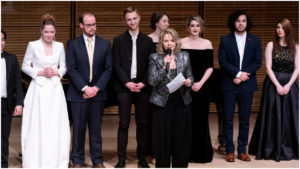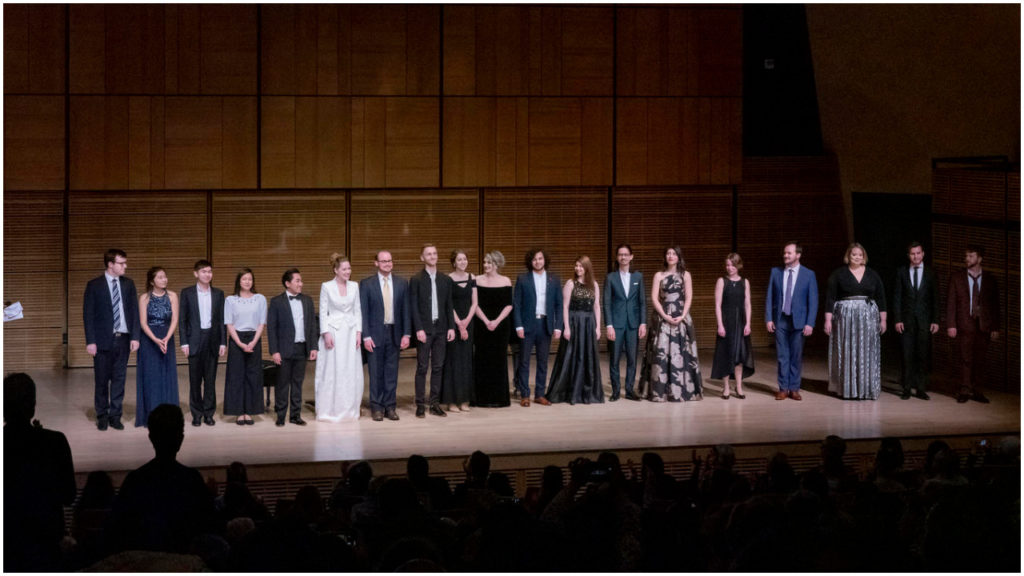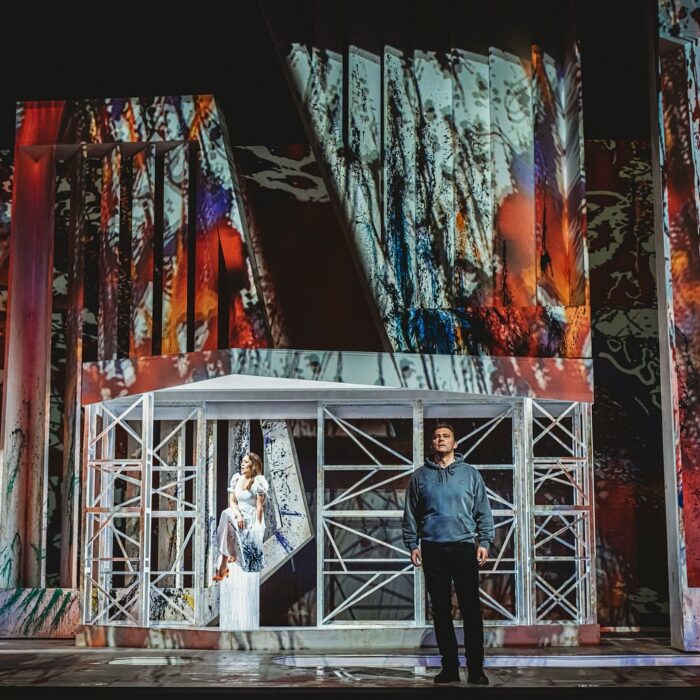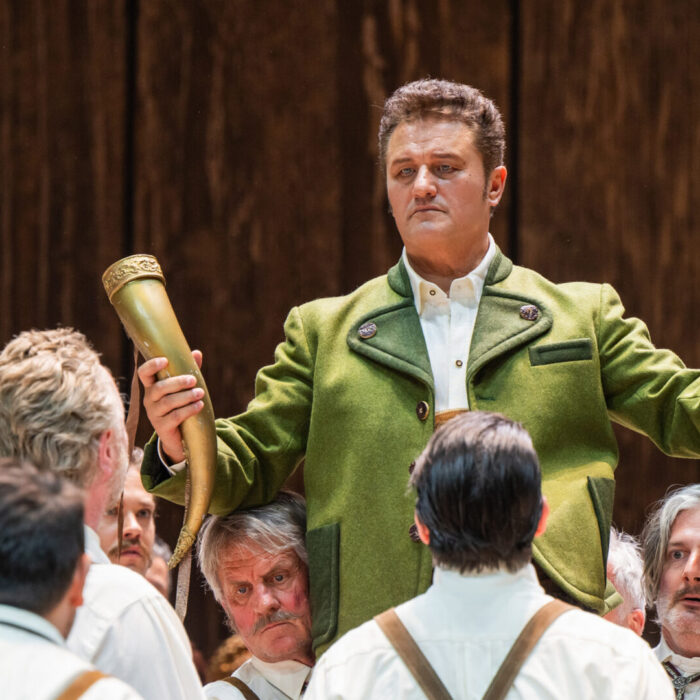
Carnegie Hall 2019-20 Season Review: SongStudio
By Logan Martell(Photo Credit: Jennifer Taylor)
On Jan. 14, 2020, SongStudio opened its second year of masterclasses and performances at Carnegie Hall, continuing in the legacy of supporting and nurturing young artists started by revered mezzo-soprano Marilyn Horne. Among the distinguished instructors of the program, led by Renée Fleming, were Elīna Garanča, Julia Bullock, Gabriel Kahane, and Hartmut Holl,
Gabriel Kahane
The first event featured composer in residence Gabriel Kahane, whose music merges influences from the classical music world with an evocative, modern perspective.
The first pair of students were soprano Anneliese Klenetsky and pianist Anna Smigelskaya, working with Kahane’s song “November” from “Book of Travelers.” After an initial performance of the song, Kahane took the artists and audience deeper into the subtleties of the piece’s text which softly painted scenes of gentle destruction and liminality.
A shockingly funny showing came from the next pair, tenor Eric Carey and pianist Tomomi Sato, working with two movements from Kahane’s “Craigslistlieder.” This work skillfully sets to music text taken from the personal ads of the website, making for a hilarious contrast. This was strongly felt from the deliberately-awkward delivery of Carey’s opening phrase “You looked sexy, even though you were having a seizure.” Kahane and Fleming had Carey polish some instances of diction, as well as living with the uncomfortable atmosphere treated by the text.
“Where does the song live right now?“ asked Fleming. “It may sound cliché, but if you’re in your vocal truth, it will be moving.”
The next pair of students, soprano Natalie Buickians and pianist Sandy Lin, performed “Singing with a Stranger” from Kahane’s “Book of Travelers.” The heavier, chordal introduction was brightened with the gentle, conversational phrases from Buickians. “Make it seem like you’re improvising… that you’re creating this in the moment” advised Fleming. As they worked through the musical passages again, it took on a soft vulnerability that was highly interesting to watch.
The last pair of students for this evening was mezzo-soprano Kady Evanyshyn and pianist Nara Avetisyan, with the song “Half a box of condoms” from Kahane’s “Craigslistlieder.” The slight dissonance of the intro was beautifully contrasted by Evanshyn’s comedic phrases which rang with an affectionate nostalgia as if addressing an old friend.
Elīna Garanča
Evanyshyn and Avetisyan also opened the second night with Elīna Garanča, working with “Ich stand in dunken Traumen” by Clara Schumann. The loving warmth of her energy carried through the description of staring at a lover’s picture which springs to life, with her loss being nicely conveyed through her closing breath. Here, Garanča had her take her time and cultivate the sense of mystery which gave her rendition a fine nuance.
Next was baritone Laureano Quant, with pianist Toni Ming Geiger, performing “La belle jeunesse” from Poulenc’s “Chanson gaillardes.” This quick song of pleasures without commitments was navigated through by Quant’s rich, energetic pattering. Due to the rapid French phrases posing some challenges with clarity, Garanča had Quant work through some passages with his nose pinched off in order to help focus his placement and resonance. Garanča also asked him about his relation to the song and his place as either narrator or witness.
“A diamond does not shine on its own, it reflects” affirmed Garanča as she helped him draw the meaning from the piece.
The next pair of students was tenor Eric Carey and pianist Tomomi Sato, with “Cantares” from Joaquin Turina’s “Poema en forma de canciones.” Carey’s opening ornaments lead to a strong, early hold as his almost-sorrowful nuance tinged the enthralled phrases of the text. Here Garanča spoke on a dark, sentimental characteristic held by flamenco, instructing Carey to collect the sound from deep within and even use it to tease and draw the audience with.
Following this was mezzo-soprano Xenia Puskarz Thomas and pianist Richard Fu, with Gustav Mahler’s “Rheinlegendchen,” from “Des Knaben Wunderhorn.” The phrases of wanting to reunite with a lover carried with a lovely sense of longing which brightened through the chain reaction caused by throwing her ring in a river. Garanča advised Thomas on making a clearer line with the German text, as well as using her taller posture to create better support and a more striking figure.
The last pair of students for the evening was baritone Dominik Belavy and pianist John Robertson, with Ravel’s “Chanson Romantique.” The prowling accompaniment was matched by Belavy’s lighthearted, whimsical approach which became more affectionate as he delved deeper into the text. Garanča helped him with drawing more from the piece, as well as the posture to help him produce a sound that will carry in larger venues.
Renée Fleming
Friday night saw the student artists being coached by Fleming personally, who in her opening remarks, humorously reflected on the week thus far as a sort of “song boot camp.”
The first pair of the evening was soprano Anneliese Kenetsky and pianist Anna Smigelskaya, with “How shall I know my true love from others now?” from Richard Strauss’ “Drei Lieder der Ophelia, Op. 67.” The piece saw Klenetsky employ an unhinged, excitable nature, with her frantic peaks nicely de-escalated by Smigelskaya’s accompaniment as it returned to an obsessive circling. Aspects of this piece that Fleming had them work on included further drawing a sense of madness from the accompaniment, as well as having Klenetsky lead the sentiment, resulting in a more authentic sound.
The next pair was Xenia Puskarz Thomas and Richard Fu, with “Anacreon’s Grave” by Hugo Wolf. The natural imagery of the text preceded and built up the idea of the grave with a rich sense of unfolding. Fleming had Thomas consider the long phrases and the underlying sentiment to be carried across them. To this end, she had Thomas engage with the descriptive qualities of Goethe’s text by reciting it as a poem.
Following this was baritone Johnathan McCullough and pianist Michael Sikich, with Leonard Bernstein’s “To What you said.” This piece saw McCullough stand while basking in the musical atmosphere created by the extended introduction. His rendition carried firm, rich tones while displaying a soft, flexible touch. Praising him for his “courage and sustained vulnerability,” Fleming advised McCullough on establishing his presence for his vocal entrance as well as resisting the temptation to “sing like Sikich is playing.”
Next up was tenor Randy Ho and pianist Celeste Marie Johnson, with Gerald Finzi’s “In Years Defaced.” His huskier, dramatic qualities lightened as he traced through the arc of the text towards magical imagery which rose above the darker opening. Fleming helped him work on his tendency to clip the ends of his sentences, letting him draw more from the text.
The last pair of students was soprano Meghan Kasanders and pianist Cameron Richardson-Eames, with Rachmaninoff’s “The Dream.” Kasanders made a lovely vocal entrance which worked well with the tender height of the accompaniment’s introduction. Here Fleming suggested more use of her middle-voice during he opening, as well as a floating quality to highlight the images of flying which make up half the text.

Putting It All Together
Finally, on Saturday night, the student artists took to Zankel Hall for a recital which made for a stunning showcase of what they learned over the course of the week-long workshop.
The first pair of student was soprano Natalie Buickians and pianist Sandy Lin. Their first selection, “Mein Lied ertony” from Dvorak’s “Zigeunermelodien,” saw Buickians take a meaningful step forward to begin the phrases of passion amidst natural imagery as the accompaniment engaged in trills and sweeping figures. Her second selection, “Where hast thou been, my love?” from Joaquin Rodrigo’s “Madrigals of Love,” was a brief and fun song that was highlighted by her amused vocal leaps that were underscored with suspicion, as well as the exchange of colors she had with the accompaniment. Their third selection,” The Fountain,” from Debussy’s “Five Poems of Baudelaire,” opened with a relaxed sonority which complimented the fluttering clarity of the accompaniment. Buickians rendition saw her engage with the text in lovely, authentic ways, showing great vulnerability even at a lower tessitura.
Next up was baritone Domink Belavy and pianist John Richardson, singing three selections from Ravel’s “Histoires naturelles.” The first selection, “The Peacock,” saw the longer introduction joined by Belavy’s firm, narrative phrases of a confident but forsaken lover, delivered with a French diction that was clear and easy to follow. The second selection, “The Swan,” carried a faster tempo as he gave the account of a swan who, failing to catch clouds with his beak, instead subsists on the worms of the earth. The swan’s failures are heard as the accompaniment dropped away, as well as the smile which shifted along with Belavy’s thoughts between sections. The third selection, “The Guinea Fowl,” saw Belavy deftly patter through the phrases which flowed between confrontation and a more settled quality, retaining a sense of levity throughout.
Following this was mezzo-soprano Kady Evanyshyn and pianist Nara Avetisyan, their first piece being Strauss’ “Die Georgine.” Evanyshyn employed a honeyed lyricism in appealing to the titular flower, nicely shaping her phrases as her words revealed her own sorrows. Her second selection, Stravinsky’s “A Song of the Dew, Op. 6, No. 2,” saw her use a delicate, calling quality which which worked wonderfully with the evocative natural imagery of the text and the thoughtful arpeggios from the accompaniment. Her phrases took on a more staccato quality as she listed off precious memories, before the sudden ceasing of colors from the accompaniment saw her return for a polished, lyrical conclusion.
Next was tenor Randy Ho and pianist Celeste Marie Johnson, with three selections from Gerald Finzi. The first, “Let me enjoy the earth,” featured a warm introduction and an affectionate vibrato from Ho. His second selection, “In years defaced,” saw him put to use what he learned from Friday night’s masterclass as he took his time with the phrases, nicely handling the alliterative phrases as the shifting sentiment was clear to see on his face. The last piece, “The Market Girl,” saw Ho flesh out the arc of the text where a casual encounter soon develops into something more meaningful.
After this was soprano Meghan Kasanders and pianist Cameron Richardson-Eames, with their first selection being “Nacht” from Alban Berg’s “Sieben fruhe Lieder.” This piece featured a soft, awed opening from Kasanders which worked well with the higher, airy introduction from the accompaniment. Her lyrical approach to the evocative phrases were nicely contrasted by Richardson-Eames’ dissonant chords. The second selection, from Johann Marx, saw Kasanders employ fuller, sustained phrases. Her soprano carried with a resonant ease that hinted at much deeper reserves of vocal strength.
Opening the second half of the program was baritone Laureano Quant and pianist singing two selections from a song cycle of his own composition, titled “Sombras,” which sets to music poems by Jose Asuncion Silva. The first piece, “Las voces silenciosas,” carried dark, gritty trills from the accompaniment, with this musical atmosphere being joined by Quant’s rich, almost-haunted sentiments. The third piece, “Estrellas Fijas,” featured higher chords which nicely contrasted Quant’s vocal depth while his Spanish diction remained clear. Between these selections was “Rhyme” by Jaime Leon. Diving right into the drama, Quant displayed great richness in tone as the repeating text nicely created feelings of obsession.
Next up was mezzo-soprano Xenia Puskarz Thomas and pianist Richard Fu, with “Stanislaw Niewiadomski’s “Kolysanka.” The tender feel of the accompaniment was matched by Thomas’ highly-affectionate phrases as the motherly sentiments gave way to a slightly fearful sense of mortality to close. Her next selection saw her joined by Belavy for Gustav Mahler’s “Verlor’ne Muh” from “Des Knaben Wunderhorn.” The utter sweetness in her voice was humorously rebuffed by the indifferent Belavy, who sat off to the side with his thoughts wrapped up in the newspaper in his hands.
The next pair of students was soprano Anneliese Klenetsky and pianist Anna Smigelskaya, with four selections from Lili Boulanger’s “Clairieres dans le ciel.” The first selection, “Sometimes, I’m sad,” featured lush trills from the accompaniment which Klenetsky joined with her lovely, mezzo-forte opening phrases. The second piece, “At the foot of my bed,” saw Klenetsky deftly navigate through the imagery evoked by the sight of a Virgo Lauretano given to the narrator by her mother, treating it with an awed sense of wonder. The third selection, “If all were but a poor dream,” saw a slower, more profound accompaniment that used a diminished sonority to highlight the uncertainty of Klenetsky’s phrases. The final piece, “We will love each other so much,” spoke of a promised meeting which Klenetsky conveyed as her phrases rang with the hope she bestowed as she described their meeting place.
Following this was tenor Eric Carey and pianist Tomomi Sato, with two selections by Schubert. The first, “To the distant one,” carried a soft energy which quickly peaked before tapering off as Carey demonstrated a somber and captivating vocal quality. The second, “Restless Love,” was fittingly handled as Carey navigated the text with great energy that did not take away from the affection of his delivery. Their last piece was Marc Blitzstein’s “Stay in My Arms,” which saw the two weave a longer narrative with remarkable sweetness of tone.
The final performance came from baritone Johnathan McCullough and pianist Michael Sikich, singing “Two Marines,” from David T. Little’s “Soldier Songs.” This strong, poignant selection opened as a blue light gradually strengthened over McCullough, breaking the darkness as he opened with a crushed sentiment that captured the grief of losing a son to war. This grieving quality was also achieved through the almost scornful bite McCullough used for his phrases which deliberately clipped off as he was unable to complete the idea. This despair reached a gripping depth as he futilely repeated “Bring me back my son” with a shifting nuance that simply ached with loss. This song ended slowly, as the fading blue spotlight fell over an empty pair of combat boots placed off to the side of the stage as the image slipped into darkness.
Throughout the week, the students of SongStudio displayed tremendous progress in their performance methods. In addition to technique, diction, and approach to the text, students were invited to consider what the truth of the piece was for them individually, and this is often what led to a breathtaking sincerity as they worked on their respective pieces. As the students go forward in their careers, they will no doubt take with them what they have learned from this week-long intensive of artistry.
Categories
Stage Reviews


